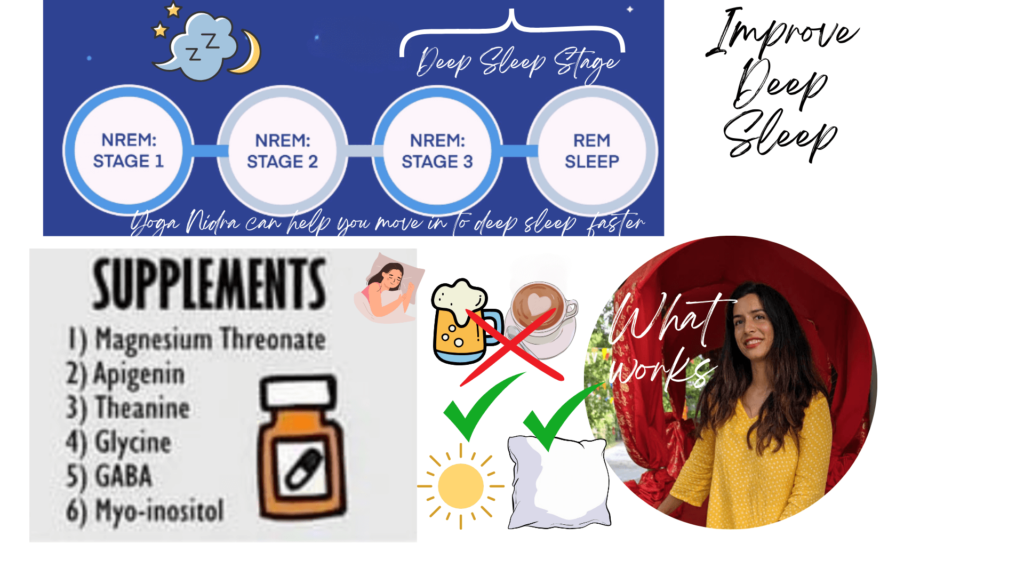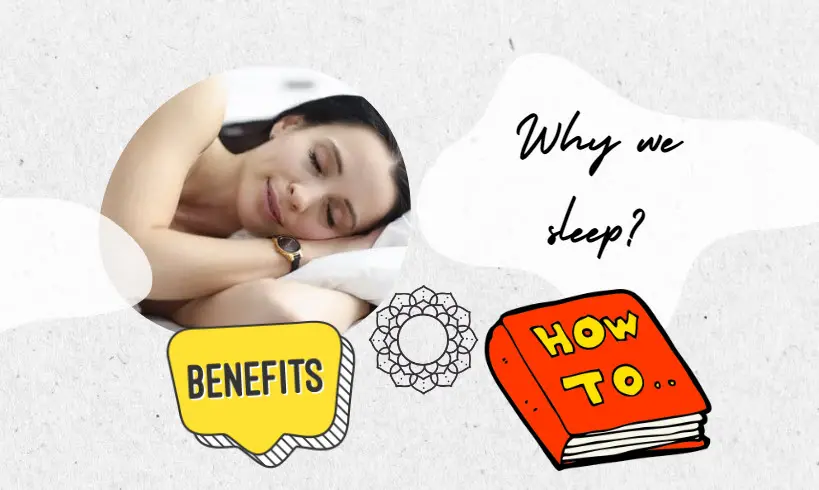As someone deeply fascinated by the intricacies of sleep, I’ve spent countless hours researching and experimenting with various methods to enhance my own sleep quality — specifically, aiming to increase my deep sleep stages. I have studied Huberman method, practiced Yoga Nidra and experimented with supplementation.
Deep sleep, or slow-wave sleep, plays a pivotal role in our overall health, aiding in physical recovery, memory consolidation, and emotional well-being.
Despite adhering to recommended sleep hygiene practices like limiting caffeine and establishing a consistent bedtime routine, many of us still ( myself included) find achieving sufficient deep sleep a challenge. This struggle is a critical obstacle for optimal health and well-being.
Sleep is important and perhaps the most important self care habbit. Especially if you have a stressful job- Sleep helps you to combat anxiety and stress. Several research studies involving top Olympic champions and sports people about their top self-care habits, and sleep topped the list. Cristiano Ronaldo and Lebron James swear by it. Research shows sleep boosts muscle recovery and performance. If it’s good enough for them, it’s good enough for us.

You can also watch this video the man who Taught Cristiano Ronaldo how to sleep https://www.youtube.com/watch?v=bBTfnwWrt0s
In the video he outlines the importance of sleep in the field of sport and in an interesting watch.
Som key points he mentions are:
- Polyphasic Sleep Benefits: Multiple sleep phases align with natural circadian rhythms, enhancing athletes’ performance and recovery. In simple words, small naps in a day are beneficial.
- Cultural and Genetic Considerations: The speaker Nick Littlehales says the influence of light exposure and genetic predispositions on sleep patterns vary. We discuss this in detail in the article and outline my own experience. As a rule of thumb we should avoid blue light before sleep to optimize melatonin production required for deep sleep.
In this article, I’ve delved into sleep hygiene and aspects which are less known, ( besides the stuff we know like caffeine avoidance). I have offered tips based on science and research papers and my personal insights from practicing Yoga Nidra.
Below you will read about the science of sleep cycles and actionable sleep tips. This includes how to get into a deep sleep and embracing techniques like deep rest with yoga nidra, the right pillow and different breathing techniques. I have shared a range of strategies designed to enhance your sleep hygiene based on what has worked for me.
Understanding Deep Sleep
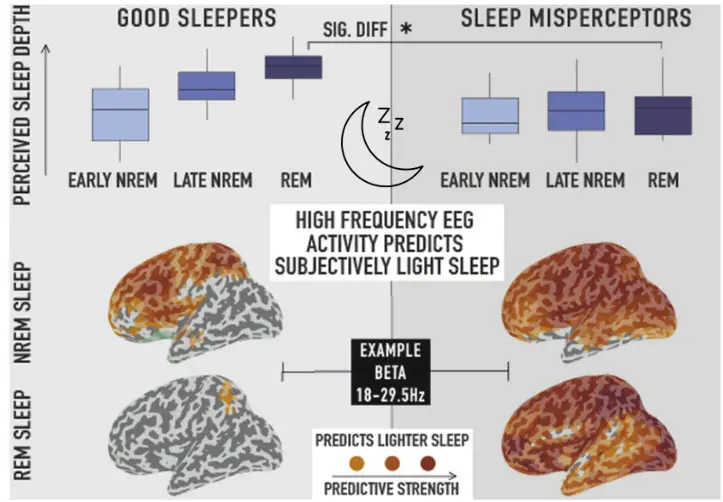
Stages of Sleep
I’ve learned that sleep isn’t just one uniform state but is divided into several stages. You have two main types of sleep: rapid eye movement (REM) and non-rapid eye movement (NREM) 1. Your journey through the night begins with lighter stages of NREM sleep, progressing into the deeper, restorative stages. Specifically, the deepest sleep happens in stage 3 of NREM, also referred to as N3 or slow-wave sleep (SWS) 2. This stage is crucial as it occupies a significant portion of your total sleep, particularly in the first half of the night 3. Yoga Nidra can help you move in to deep sleep faster.
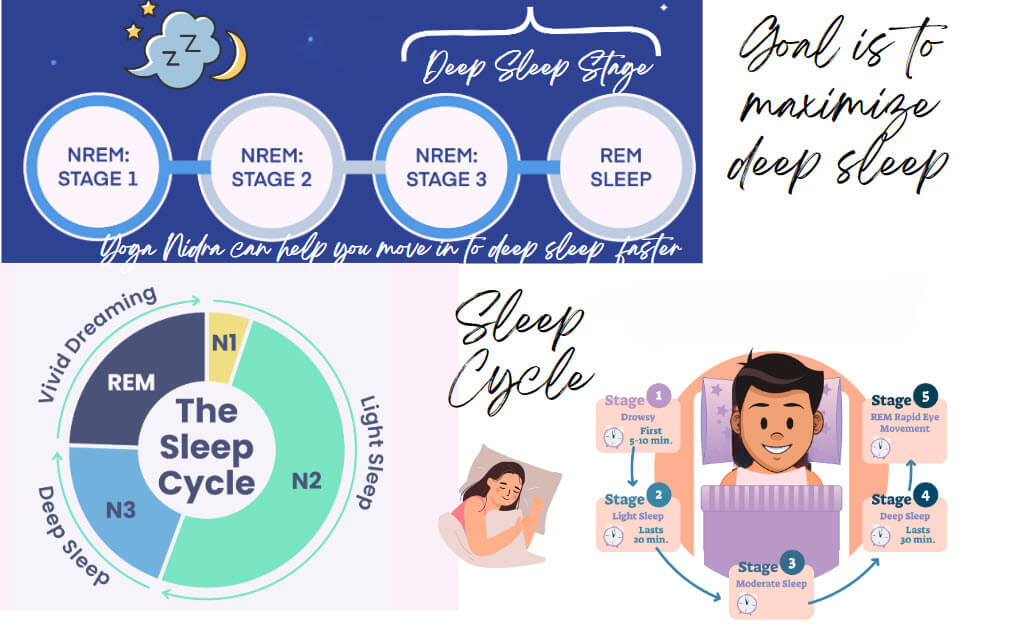
Characteristics of Deep Sleep
During deep sleep, our external awareness decreases significantly, and while it might seem like everything is shut down, some vital internal activities are at their peak during deep sleep. The breathing and heart rate slow down, my muscles relax, and my brain begins to emit slow, long delta waves 2. In short, if we are able to maximize our deep sleep, we would have achieved optimal rest.
If you are a data nerd, you can use your WOOP band or Apple watch to measure deep sleep, and see what works. For example: That pastry before sleeping, effects my blood sugar leading to less than optimal sleep. When you know what works/doesnt work for you, you can make ifnromed choices. I prefer a night of deep rest on most days. PRO TIP: Avoid desserts before sleep.
N3/deep sleep, as shown above, this stage is not only about physical rest but also involves significant physiological repairs and memory consolidation 1.
One fascinating aspect I’ve come to appreciate is how our bodies use this time to regulate and recover. Sleep scientists are still to understand the details, but here is a quick overview.
The parasympathetic nervous system takes over, often referred to as the ‘rest and digest’ system, which helps lower blood pressure and heart rate 2. Additionally, there’s a decrease in overall energy expenditure, allowing for tissue repair and growth hormone release, crucial for both physical growth in children and daily tissue repair in adults 2.
If you have a Big meeting day coming up , or you spent your morning doing an intensive work out at the gym, and you want to see muscle growth, sleep is perhaps your most crucial component for success/muscle growth.
Moreover, deep sleep plays a vital role in cognitive health. It’s during this stage that the brain processes and consolidates memories, making it fundamental for learning and memory retention 2. Interestingly, the brain also uses this time to clear out waste products, which can help prevent neurodegenerative diseases like Alzheimer’s 2.
As I continue to explore and experiment with ways to enhance my deep sleep, these insights guide my approach, helping me target the most beneficial practices for optimal sleep health.
The SLEEP FORMULA -10-3-2-1-0 sleep rule entail?
The 10-3-2-1-0 rule for sleep is a guideline designed to enhance sleep quality: 10 hours before bed, avoid caffeine; 3 hours before bed, stop eating or drinking; 2 hours before bed, cease any work-related activities; 1 hour before bed, eliminate screen time; and 0, the number of times you should hit the snooze button.
Practical Expert Tips
Caffeine and Alcohol Management
Managing caffeine and alcohol intake is crucial. I’ve noticed that limiting my coffee consumption to just one cup early in the day significantly impacts my ability to fall into deep sleep. Caffeine has a long half-life, meaning it can stay in the system and continue to affect us far longer than we might expect. As a rule of thumb turn of caffeine 10 hours before you sleep. So just back calculate your curfew time. For me this is 3:00pm.

Similarly, while alcohol might initially seem like it helps with falling asleep, it actually disrupts the sleep cycle, particularly the deep sleep stages. I’ve found it beneficial to avoid alcohol or limit its intake, especially close to bedtime. If you’ve had alochal, try drinking lots of water before sleeping to overcome this.
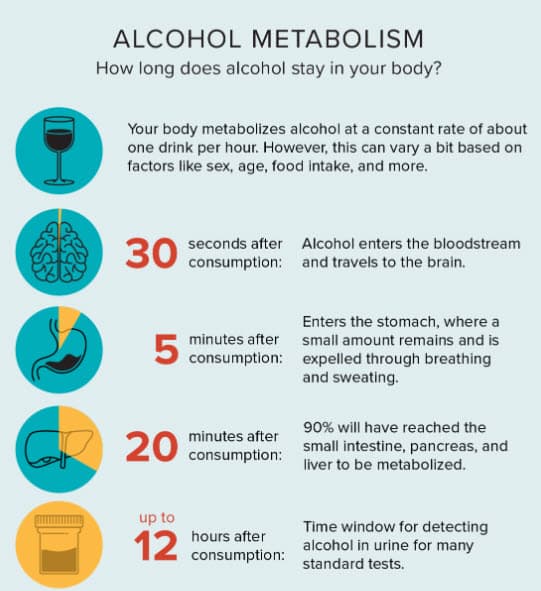
Screen Time Reduction Before Bed
Reducing screen time before bed is another effective strategy I’ve adopted. The blue light emitted from screens can interfere with the natural production of melatonin, the hormone responsible for regulating sleep.
By setting a strict rule to turn off all electronic devices at least an hour before bed, I’ve been able to enhance the quality of my sleep significantly. Okay I am not 100% successful and there are days we all binge watch Netflix but I try to keep a strict discipline on weekdays. Since I have seen this WORKS FOR ME, it definitely helps me prioritize this self care habbit. Experiment on your own and see the difference it makes. Start of a a good day always starts the night before.
Instead of scrolling through my phone, I’ve replaced this habit with reading a book or practicing relaxation techniques like soft music ( Spotify and YouTube have tons os options), which not only help me unwind but also prepare my body and mind for a restful night.
Comfortable Bedding and Temperature
Ensure your room is set between 69°F and 75°F or 21-24 degrees optimally. Thats scientifically proven, and is ideal for the body to go in to deep sleep.
Finally, investing in comfortable, high-quality bedding has made a considerable difference in my sleep quality. Ensuring that my sleep environment is conducive to relaxation involves more than just a quiet room; it also means having a supportive mattress and pillows that align with my sleeping preferences. Additionally, choosing bedding made from breathable materials helps maintain a comfortable body temperature throughout the night, further promoting deep sleep.
PRO-TIP: Bamboo, and cotton sheets all possess cooling properties at varying degrees. These are my personal preference and have worked for me. You can DM me and I can share my personal preferences.
By creating an optimal sleep environment, I’ve noticed a marked improvement in both the duration and quality of my deep sleep stages.
Personal Approaches to Improve Sleep Quality
Developing a Relaxing Pre-Sleep Routine
I’ve found that establishing a relaxing pre-sleep routine is instrumental. One effective strategy I’ve adopted is preparing for the next day ahead of bedtime. This includes simple tasks like setting out clothes, preparing mentally for breakfast, and organizing essentials. By tackling these chores, I reduce bedtime stress and avoid overthinking about the next day’s responsibilities, which can impede my ability to fall asleep quickly 4. Additionally, engaging in calming activities such as reading a book, listening to soothing music ( see notes above), or practicing gentle yoga/Yoga Nidra/NSDR helps me wind down and signals my body that it’s time to rest 4.

Optimal Sleeping Position
Discovering the optimal sleeping position has been a game-changer for my sleep quality. I’ve learned that not all sleep positions are equally beneficial for everyone.
For instance, side sleeping is particularly advantageous for reducing snoring and managing sleep apnea, as it helps keep the airways open 5. It also supports spinal alignment, which is crucial for preventing back pain 6 5. On the other hand, back sleeping, while beneficial for neck pain and nasal congestion, is not recommended for those with sleep apnea or lower back issues 5. Understanding these nuances has allowed me to tailor my sleeping position to address specific health concerns and enhance my overall sleep quality 6 5.
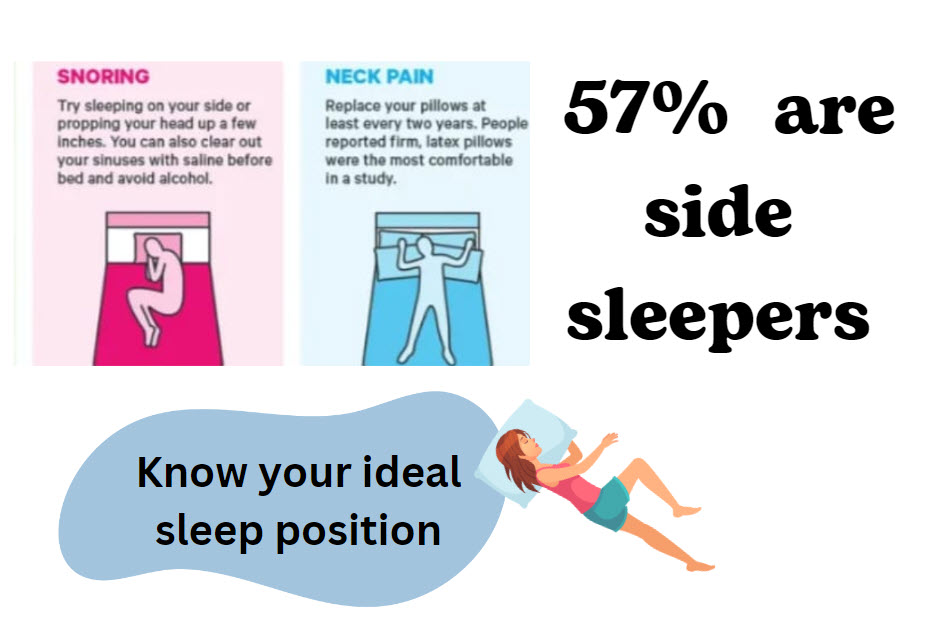
Overcoming Sleep Challenges
Combating Insomnia
In my personal journey to better sleep, I’ve discovered that combating insomnia requires a multifaceted approach. It’s not just about avoiding caffeine or creating a dark, quiet sleep environment. I’ve learned that waking up at the same time each day is crucial. This consistency helps regulate my body’s clock, making it easier to fall asleep and wake up naturally 7.
It’s important to establish and maintain a regular sleep pattern, training the body to associate sleep with specific cues like darkness and a consistent bedtime 7.
And ofcourse since I am a Yoga Nidra teacher so I strongly recommend Yoga Nidra as an effective tool for deep sleep and combating Insomnia. Just use one of our audio guides and it should calm your mind through systematic body scans and breathing.
Handling Night time Interruptions
Nighttime interruptions can be a major barrier to achieving deep, restorative sleep. Going to pee multiple times can be an issue which prevents deep rest. Frequent urination can be caused by factors like excessive fluid intake, caffeine, or urinary tract infections. To reduce this, limit fluids before bed, avoid caffeine and alcohol, and practice pelvic floor exercises. This can be also solved with supplementation of magnesium and melatonin.
From my experience, optimizing the sleep environment is key. This means ensuring the bedroom is conducive to sleep, with controlled temperature ( as much as possible), lighting, and noise levels. For instance, if a partner’s snoring disrupts sleep, solutions like earplugs or white noise machines can be effective 8.
Addressing factors unique to my situation, such as stress or lifestyle habits, has also been game changing. Reducing stress through techniques like deep breathing or meditation before bed helps prevent those middle-of-the-night wake-ups. Moreover, avoiding heavy meals or excessive fluids before bedtime ensures that my sleep isn’t interrupted by the need to use the bathroom 8.
Refer to the The 10-3-2-1-0 rule for sleep which I have put above.
Supplementation to improve sleep

We analyzed the top magnesiums. Based on research and also recommended by Dr. Andrew Huberman the Top Magnesium supplement is “MOMENTOUS MAGNESIUM L THREONATE”
Selecting the right Magnesium for you can definitely EXPONENTIALLY IMPROVE SLEEP There are multiple mangesium supplements. Magnesium Citrate Vs Glycinate. For Insomnia we recommend Magnesium Glycinate to help with melatonin production which helps deep sleep and rest.
Nose Breathing helps with better rest and sleep
Train yourself to be a better nose breather. I still havent tried this myself but ordering medical mouth tape to help with better nose breathing can help with better rest. If you suffer from sleep apnea research shows contrasting reports. I would in that case suggest you consult a doctor.
Final summary of months of research on deep sleep: Featuring Sleep Dragon
I’ve underlined the significance of understanding your own sleep cyle.
1 thing to note natually all animals/mammals are polyphasic sleeps that is sleep multiple times a day. I have found for myself small afternoon naps (Since I WFH) have been game changing.
- A 10 minute nap or Yoga Nidra in the middle of the day works wonders for my energy levels. Dont believe me. You should try it.
- 10-3-2-1-0 rule for sleep is a guideline designed to enhance sleep quality: 10 hours before bed, avoid caffeine; 3 hours before bed, stop eating or drinking; 2 hours before bed, cease any work-related activities; 1 hour before bed, eliminate screen time
- Avoid Caffeine and alcohal as much as possible. Good Sleep and they dont go together
- Sleep on your side or prop your head up a few inches if you are prone to snore or have sinuses as myself.
- Consider taking: Magnesium Threonate, Apigenin, Theanine, Glycine, GABA, Myo-inositol for better sleep quality.Magnesium Glycinate helps in Melatonin production.
- Optimize your morning: 30-60 minutes after waking exposure to sunlight, cold shower to boost adrelanie
Embracing these tips, like managing a relaxing pre-sleep routine, alongside personal insights on understanding what works or doesnt work for you can help you optimize sleep.
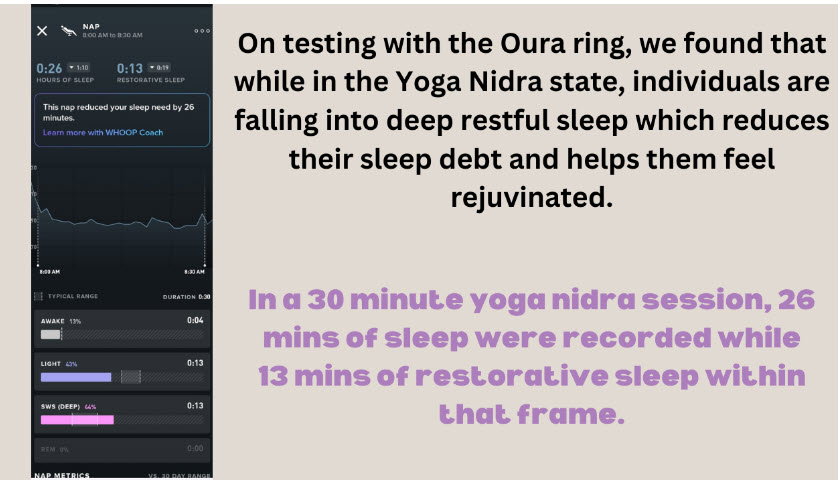
We invite you to further this conversation and deepen your understanding by joining our FREE WhatsApp community. Join this opportunity here, and embark on a journey toward enhanced well-being with a like-minded community.
FAQs
What does the 10-3-2-1-0 sleep rule entail?
The 10-3-2-1-0 rule for sleep is a guideline designed to enhance sleep quality: 10 hours before bed, avoid caffeine; 3 hours before bed, stop eating or drinking; 2 hours before bed, cease any work-related activities; 1 hour before bed, eliminate screen time; and 0, the number of times you should hit the snooze button.
How can I enhance the quality of my deep sleep?
To improve deep sleep, consider engaging in relaxation techniques before bedtime. Effective methods include mindfulness, meditation, listening to calming music, reading, taking a warm bath, practicing deep breathing exercises, or visualization. These activities are beneficial for overall sleep quality and can help manage insomnia.
Which supplement is recommended for better deep sleep?
Melatonin supplements are commonly recommended to enhance deep sleep. I personally take Magnesium Glycinate which helps with Melatonin which is a natural hormone that regulates the sleep-wake cycle. It can be particularly helpful for addressing sleep disturbances like jet lag or difficulties in falling or staying asleep. Generally, melatonin is considered safe for short-term use in healthy adults.
What are some tips for achieving deep sleep?
To achieve better deep sleep, follow these six tips: maintain a consistent sleep schedule; monitor your dietary intake to avoid going to bed too full or hungry; create a calm and comfortable sleeping environment; incorporate physical activity into your daily routine; and manage stress and worries effectively.
References
[1] – https://www.healthline.com/health/deep-sleep
[2] – https://www.webmd.com/sleep-disorders/sleep-body-effects
[3] – https://my.clevelandclinic.org/health/body/12148-sleep-basics
[4] – https://www.healthline.com/health/nighttime-routine
[5] – https://www.cnet.com/health/sleep/a-sleep-scientist-says-this-is-the-best-sleeping-position/
[6] – https://www.sleepfoundation.org/sleeping-positions
[7] – https://www.webmd.com/women/insomnia-tips
[8] – https://www.sleepfoundation.org/sleep-deprivation/interrupted-sleep

